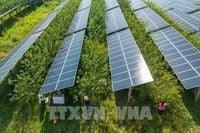In a significant event that has raised alarms about the reliability of renewable energy sources, Spain and Portugal recently experienced the first major power outage in the renewable energy era, affecting over 50 million people. The outage, which lasted nearly half a day, has sparked discussions on energy management and the challenges posed by high reliance on solar and wind energy.
On April 28, 2025, a widespread power outage hit the Iberian Peninsula, leading to the declaration of a "state of emergency" in both countries. The mobile networks were severely impacted, leaving thousands of antennas across Spain inoperative. This situation highlighted the vulnerabilities in the telecommunications infrastructure, as users scrambled to find alternative means of connectivity.
In the wake of the blackout, the usage of Starlink satellite internet service surged dramatically. According to an analysis by the Financial Times, the number of Starlink users in Spain and Portugal increased by 35% on the day of the outage. By the following day, usage in Spain was reported to be 60% higher than average as traditional mobile networks struggled to recover.
While the outage itself was a wake-up call for both countries, it also raised critical questions about the management of renewable energy sources. A report released in February 2025 by the parent company of the Spanish electricity grid operator indicated that significant challenges lay ahead in managing the system effectively. The incident forced Spain to consider potentially limiting the amount of solar energy fed into the grid at any given time, a move that has met with resistance from renewable energy advocates.
Experts have pointed out that while renewable energy is critical for a sustainable future, the current infrastructure may not be equipped to handle the demands of a fully renewable energy grid. The outage has prompted calls for improved international connections between Spain and Portugal to bolster energy sharing and stability. As the Straits Times noted, the recent blackout is a stark reminder that the transition to green energy is fraught with challenges that require immediate attention.
The outage's impact was felt across various sectors. With mobile networks down, many were left without access to essential services. Reports emerged of people trapped in elevators and public transport systems, highlighting the chaos that ensued. Airports were closed, and train services were disrupted, leading to significant inconvenience for travelers.
Vodafone Espana reported that generators had been deployed at 70% of its facilities when the outage occurred, but even this precaution was not enough to maintain operations. By 11 PM on the day of the outage, mobile traffic remained low in many areas, with some regions experiencing only 20% coverage. In contrast, Telefonica managed to restore 95% of its mobile network within 24 hours, returning to normal operations by May 1, 2025.
The cause of the outage remains unclear, with authorities ruling out the possibility of a cyberattack. Some experts suggest that an abnormal spike in solar energy supply may have contributed to the grid's failure. This incident serves as a critical lesson for energy management in the renewable era, emphasizing the need for robust systems that can handle unexpected surges in energy production.
The event has prompted discussions not only about the immediate response to the outage but also about the long-term sustainability of renewable energy sources. As countries transition to greener energy solutions, the lessons learned from this incident may shape future policies and infrastructure developments.
In the face of these challenges, Spain and Portugal must navigate the complexities of energy management while ensuring that their transition to renewable sources does not compromise reliability. The recent outage has underscored the importance of a balanced energy mix that includes traditional sources alongside renewables, as fossil fuels are likely to remain part of the energy landscape for years to come.
The incident has sparked broader discussions about energy policy across Europe. As countries grapple with the implications of renewable energy reliance, the lessons learned from Spain and Portugal's experience could inform strategies aimed at enhancing energy resilience. With over 60 million people affected by the outage, the stakes are high, and the need for effective solutions is urgent.
As Spain and Portugal work to recover from this unprecedented event, the focus will likely shift toward developing a more integrated and resilient energy system. This may include investing in new technologies and infrastructure capable of stabilizing the grid during peak production times and ensuring that the transition to renewable energy is both sustainable and reliable.
The recent power outage serves as a critical reminder of the challenges that lie ahead in the pursuit of a greener future. As the world moves towards renewable energy, ensuring stability and reliability in energy supply will be paramount. The lessons learned from this incident could pave the way for a more resilient energy landscape in Europe and beyond.




